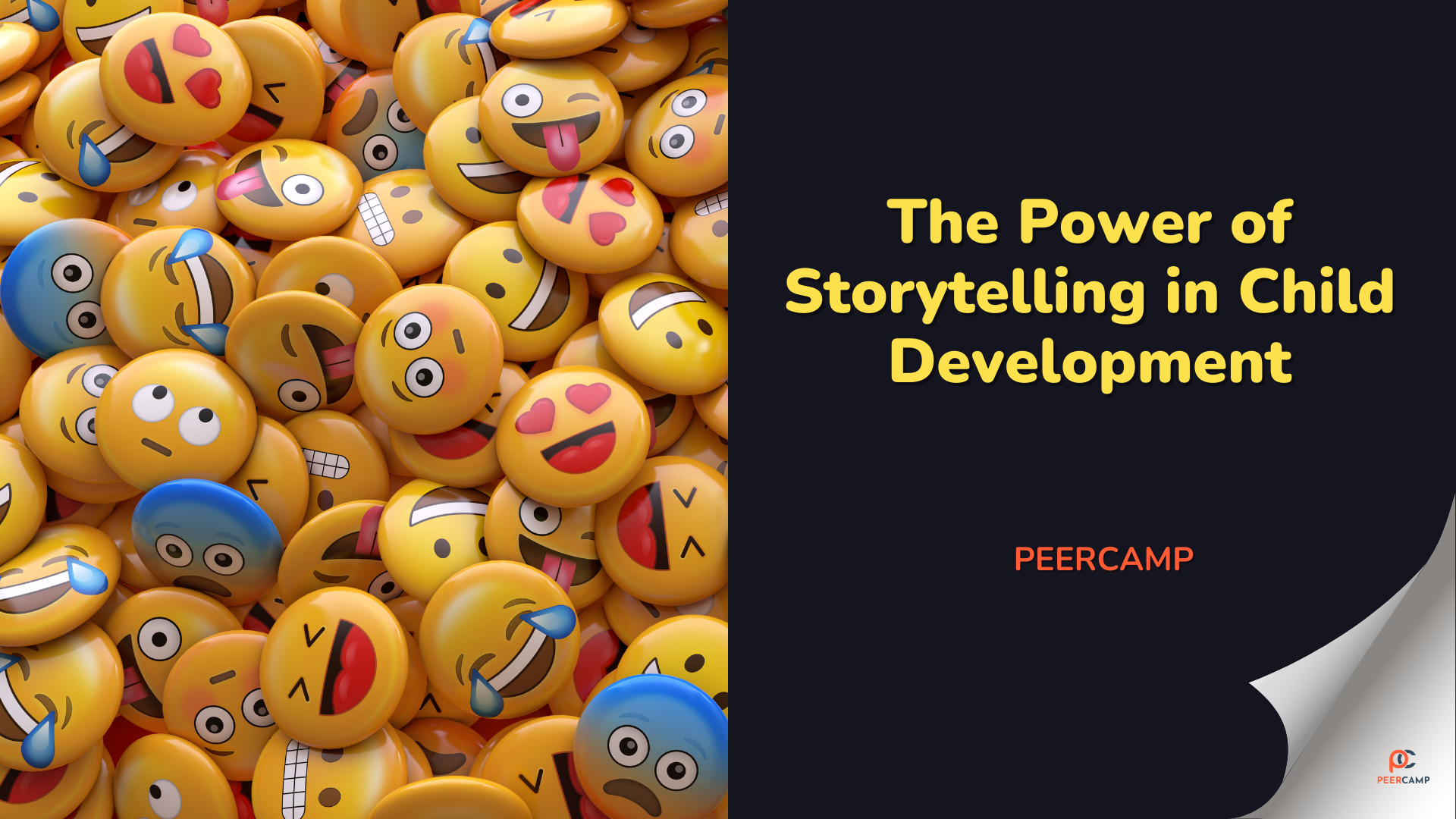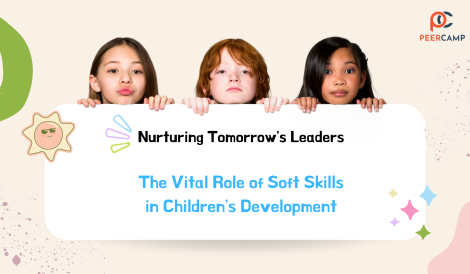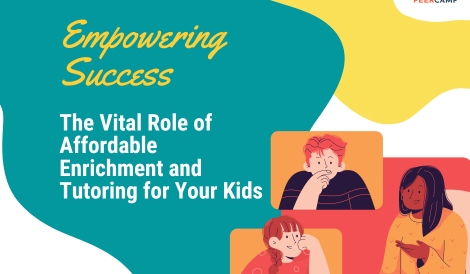In today’s fast-paced and interconnected world, communication is a cornerstone skill that transcends industries and disciplines. Public speaking is not merely an asset—it’s a necessity. At PeerCamp, we believe that nurturing this vital skill from an early age can empower children to excel academically, socially, and professionally.
In this blog, we’ll explore the top 5 reasons your child should learn public speaking and how PeerCamp’s engaging courses can help set the stage for their success.
1. Boosts Self-Confidence
Confidence is the foundation of success, and public speaking helps children build it from the ground up.
- Facing an Audience: Standing in front of a crowd, whether big or small, instills a sense of accomplishment and courage.
- Expressing Opinions: Public speaking teaches children to articulate their thoughts clearly, boosting their self-esteem.
- PeerCamp Advantage: Our interactive sessions encourage kids to participate in real-time discussions, Q&As, and polls, making them feel heard and valued.
2. Enhances Communication Skills
Strong communication skills are critical for personal and professional growth.
- Verbal Clarity: Children learn to organize their thoughts and present ideas succinctly.
- Listening Skills: Public speaking also fosters active listening as children adapt to audience feedback.
- Global Exposure: PeerCamp’s international instructors expose students to diverse communication styles, improving adaptability.
3. Improves Academic Performance
Public speaking is not just about words—it’s about thinking critically and presenting arguments effectively.
- Presentation Skills: Students excel in school projects and oral examinations by mastering presentation techniques.
- Critical Thinking: Public speaking helps children analyze and structure information logically.
- Academic Advantage with PeerCamp: Our courses integrate academic topics like history and science into public speaking lessons, ensuring holistic growth.
4. Prepares Them for Leadership Roles
The ability to lead is rooted in the ability to inspire, motivate, and communicate effectively.
- Influencing Others: Public speaking trains children to persuade audiences and rally peers behind ideas.
- Confidence to Lead: From school captaincies to future boardrooms, public speaking lays the groundwork for leadership success.
- PeerCamp Leadership Programs: Our specialized courses combine public speaking with leadership training, ensuring your child is equipped to excel.
5. Builds Resilience and Adaptability
Life is unpredictable, and children need to be prepared to navigate challenges with poise.
- Overcoming Fear: Public speaking teaches kids to manage stage fright and anxiety effectively.
- Adapting on the Spot: Improvisation skills gained through public speaking prepare children for unanticipated situations.
- Interactive PeerCamp Classes: With live gigs and role-playing activities, our courses ensure children learn to adapt dynamically.
Why Choose PeerCamp for Public Speaking Courses?
At PeerCamp, we combine expertise with flexibility to create an unparalleled learning experience.
- Global Expertise: Learn from esteemed international educators.
- Interactive Learning Tools: From polls to digital whiteboards, our live classes keep kids engaged.
- Customizable Formats: Choose from live sessions, pre-recorded content, and group classes to suit your child’s schedule.
- Holistic Development: Explore creative, academic, and life skill courses alongside public speaking to ensure well-rounded growth.
- Professional Certificates: Your child’s achievements will be recognized with globally verifiable certificates they can proudly showcase.
Additional Benefits of Learning Public Speaking
- Networking Opportunities: Build connections through events, competitions, and group discussions.
- Cultural Awareness: Engage with peers and mentors from diverse backgrounds.
- Personal Growth: Develop empathy, social awareness, and a growth mindset.
Conclusion
Public speaking is more than a skill—it’s a gateway to confidence, communication, and leadership. PeerCamp is committed to providing your child with the resources and support to master public speaking while cultivating other essential abilities. By enrolling your child in our courses, you’re investing in their present and future success.
Let PeerCamp be your partner in empowering your child to stand tall, speak confidently, and inspire the world.
FAQs
Q1: What age is suitable for children to start public speaking?
Children as young as 5 years old can begin learning basic communication and presentation skills.
Q2: How are PeerCamp’s public speaking courses different?
We offer a blend of global expertise, interactive tools, and customizable class formats tailored to your child’s learning style.
Q3: Can shy children benefit from public speaking classes?
Absolutely! Our supportive environment and step-by-step approach help shy kids gradually overcome their fears.
Q4: Will my child receive a certificate?
Yes, children receive professional certificates upon course completion, enhancing their portfolios.
Q5: How do I enroll my child in PeerCamp’s public speaking courses?
Visit PeerCamp’s website to explore and register for our public speaking courses today!
Storytelling is a timeless tradition that transcends cultures and generations. For children, it’s more than just entertainment; it’s a tool to develop critical communication and leadership skills. Every child has a unique story to tell, and through storytelling, they unlock the confidence to communicate, connect, and lead effectively in a global world.
Why Storytelling Matters for Kids
1. Enhances Emotional Intelligence
Storytelling helps children understand and express emotions. By engaging in narratives, they develop empathy and learn to navigate social situations more effectively.
2. Boosts Memory and Retention
According to studies, stories are 22 times more memorable than plain facts. This makes storytelling a powerful tool for learning and retaining information, whether it’s academic concepts or life lessons.
3. Fosters Creativity and Critical Thinking
Creating and telling stories encourages kids to think outside the box, solve problems, and develop imaginative solutions.
4. Improves Communication Skills
Storytelling builds clarity in thought and language, helping kids articulate their ideas confidently.
The Science Behind Storytelling: Engaging the Brain
Neuroscience reveals that storytelling activates multiple areas of the brain, creating a synchronized connection between the storyteller and the listener. This “mind synchronization” fosters deeper engagement and understanding, making learning more effective and enjoyable for kids.
How to Integrate Storytelling into Learning
Storytelling can be seamlessly integrated into both academic and creative learning through innovative methods designed for kids from kindergarten to Grade 12. Here’s how:
1. Language Skills: Transforming Grammar and Vocabulary into Narratives
Turn language lessons into exciting stories. By weaving grammar and vocabulary into engaging narratives, kids not only learn the rules of language but also use them creatively in real-life contexts.
2. Science Concepts: Explaining the “Why” with Relatable Examples
Storytelling makes abstract science concepts tangible. For instance, explaining photosynthesis through a story of a “lonely leaf” simplifies complex ideas and makes them relatable.
3. Creative Thinking: Developing Ideas into Compelling Stories
Encourage kids to brainstorm, structure, and present their ideas in the form of captivating stories. This nurtures their creative confidence and helps them articulate their thoughts clearly.
Benefits of Storytelling for Lifelong Success
1. Builds Confidence and Leadership Skills
Sharing stories helps kids gain confidence in their voice and ideas, laying the foundation for leadership skills.
2. Enhances Academic Performance
Storytelling fosters a deeper understanding of academic subjects by making learning more interactive and memorable.
3. Strengthens Interpersonal Relationships
By practicing storytelling, children develop better listening and conversational skills, leading to stronger connections with peers and mentors.
How Parents Can Encourage Storytelling at Home
Parents play a vital role in nurturing their child’s storytelling abilities. Here are some tips:
1. Ask Open-Ended Questions
Encourage creativity with prompts like, “What would happen if you met a dragon?” or “How would you solve a mystery in space?”
2. Celebrate Creativity, Not Perfection
Focus on the joy of storytelling rather than grammatical accuracy. This builds confidence and encourages kids to share their stories without fear of judgment.
3. Share Your Own Stories
Inspire your child by sharing your experiences and anecdotes. This creates a bonding moment and shows them the value of storytelling in real life.
Ready to Empower Your Child?
Empowering children to share their stories confidently provides them with tools to excel academically, socially, and creatively. From transforming language lessons into narratives to explaining science concepts through relatable examples, an innovative storytelling approach sets children up for lifelong success.
The Story Starts Here
Storytelling is more than an art, it’s a skill that fosters clear thinking, emotional intelligence, and the ability to simplify complex ideas. By encouraging storytelling, we empower kids to communicate, connect, and lead with confidence. Explore opportunities for your child to develop storytelling skills and give them the gift of a voice that will resonate throughout their lives.




